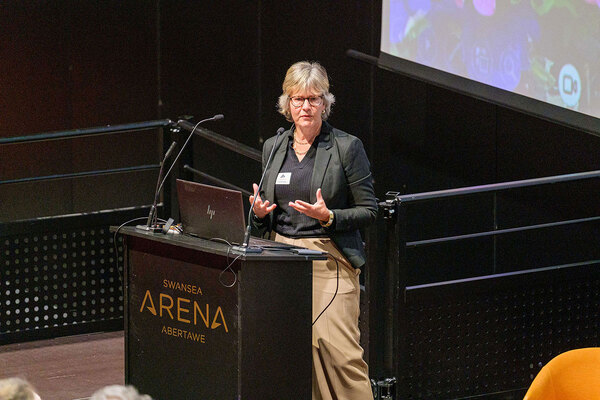You are viewing 1 of your 1 free articles
Northern Ireland Budget Bill ‘welcome’ but concern over funding uncertainty remains
The Northern Ireland Budget Bill is “welcome” but uncertainty around long-term funding could impact social homes and net zero, housing associations have said.
The bill, which had its second reading in the House of Commons last week and was backed by MPs, will allow the government to pass a budget for Northern Ireland for this financial year in the absence of a functioning Northern Ireland executive.
But the Northern Ireland Federation of Housing Associations (NIFHA) said that planning budgets year to year “cannot properly support major projects, such as social housing”.
The budget sets out spending allocated to Stormont’s nine departments, including £5.7bn for the Department for Communities (DfC), which is responsible for housing.
Housing was allocated nearly £432m across resources and capital. The majority of the net capital funding – £211m – went to the Northern Ireland Housing Executive (NIHE), which administers the Social Housing Development Programme (SHDP). It provides grant to housing associations to buy or build new properties.
The bill has been fast-tracked as Northern Ireland has been without an executive since former first minister Paul Givan, from the Democratic Unionist Party (DUP), stepped down last February in protest against the Northern Ireland Protocol.
The post-Brexit deal means checks are required on goods coming into Northern Ireland from the rest of the UK.
Sinn Féin made history in May after becoming the first Irish nationalist party to win the most votes in a Northern Ireland Assembly election.
But the DUP, which has held the post of first minister since 2007, said it is not prepared to re-enter a power-sharing executive until its concerns about the protocol are dealt with.
Steve Baker, the Northern Ireland Office minister, who introduced the second reading of the bill on 23 January, said he “once again” had a “strong sense of disappointment”.
He said: “Setting the budget was not an easy task. Northern Ireland departmental ministers were in post until 28 October, which meant we could take over only from that point.
“They had not been operating with confirmed spending limits and had not implemented plans to deal with their looming overspends.”
He said that Northern Ireland’s finances “did not happen overnight”, adding that “successive former executives also failed to put finances on a sustainable footing”.
“As a result, the government inherited a budget halfway through the year with an overspend of some £660m.
“That is unacceptable, and the unsustainability of Northern Ireland’s finances cannot continue,” Mr Baker said.
He said if an executive is not formed to agree a budget for 2023-24, Westminster will have to step in. He said this would be “tricky”.
“Without Northern Ireland executive ministers in place, it has not been possible to take the difficult political decisions necessary to balance the budget at this very late stage in the year, and that of course compounds the problem for next year.”
On the new bill Seamus Leheny, chief executive of NIFHA, told Inside Housing that once it passes there will be a “general welcome for some level of certainty on budget allocations across all departments”.
But he said this is “not a strategic or effective way of addressing the issues we face”.
“Holding pattern budgets cannot bring the certainty we need, and cannot promote the innovation and new ways of thinking that are needed to transform the local economy.
“There is concern that this budget will simply roll on the current practices, while other areas on these islands are already making strategic investment decisions that will prepare all sectors for issues, such as meeting net zero targets.”
He said that housing associations have “long been arguing” for the introduction of multi-year budgets, which will help in the delivery of construction and infrastructure projects.
“Planning budgets year to year cannot properly support major projects, such as social housing. At NIFHA, we want to know how the long-term support for meeting housing need is going to be addressed, and how retrofitting and energy efficiency will be funded.
“If we are not seeing budgets reflect these issues now, we are in danger of falling further behind,” Mr Leheny said.
There are also concerns about a reduction in social homes if there continues to be no executive in place.
In 2021, the executive set out a draft budget for 2022-25.
At the time, the NIHE said that the multi-year plan was “welcome” but raised concerns that the budget represented a real-terms cut to funding that would require a reduction in services.
“If new social housing is to be delivered within 80% of the total departmental capital budget in Year 3, the numbers of new social housing could be as low as 600 to 800 units [compared to a current target of 1,900],” it said.
Justin Cartwright, director at the Chartered Institute of Housing Northern Ireland, said a “big threat” to housing would be if there were still no ministers in place for the 2024-25 financial year.
“Because that year was tough for overall capital, the settlement for housing in that year was significantly lower,” he explained.
DfC capital funding allocations in the three-year budget dropped from £214m in 2022-23 to £185m in 2024-25.
Mr Cartwright said: “If there was a minister in place, I don’t think anyone would stand over that. They would manage to get more money through in-year allocations.”
An NIHE spokesperson said it was too early to comment on the implications of the bill for housing.
Sign up for our Northern Ireland bulletin
Already have an account? Click here to manage your newsletters












